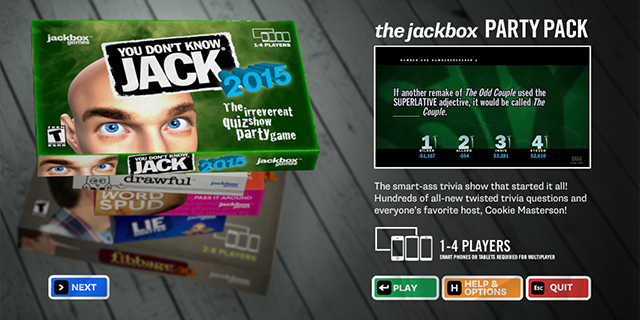
The last release from Jackbox Games, Fibbage, was definitely a fun game, but it was also an experiment in using tablets and phones to control games on your TV. The Jackbox Party Pack represents the next logical step in that exploration, though the release itself was definitely a surprise. The compilation includes five games, including a new You Don’t Know Jack and a version of Fibbage with more questions, and it’s angling for a spot at your next game night.
The games themselves really aren’t connected, so it’s best to address them all individually. Fibbage returns here with an extra batch of questions, but it’s otherwise identical. That’s okay, because the game’s great in its simple, streamlined way, though those who picked up the original version will find old questions popping up occasionally. If you haven’t played it yet, though, it’s clearly the star of the show. It most effectively uses the control scheme of the Party Pack: all someone needs to do is head to Jackbox.tv on a phone, tablet or computer and input a room code and name. In Fibbage, this scheme has no real drawbacks, and lets players input text in secret in a way you just couldn’t do with controllers.
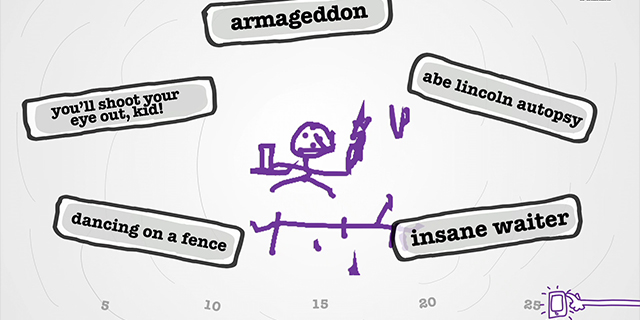
Those who like Fibbage will also find a lot to love in Drawful. It uses a similar setup (though a different aesthetic and host that fits well), but relies on drawing pictures. Each player (up to 8) gets a phrase and has to sketch it out, and then all players go through these pieces, one by one, and does the “put in a bluff answer, then guess the original phrase” thing. Drawing is also something you can’t do on (most) controllers, and Drawful benefits similarly from the secret phrase entering setup. It’s also a lot of fun; there’s less of a worry about repeated questions ruining the mood, as one person’s interpretation will rarely resemble another’s.
There are a few things to keep in mind, though. Since drawing takes longer, there’s more downtime here. Also, drawing on a phone isn’t exactly easy; that can be funny, but it’s likely that you’ll have a player from time to time who gets really frustrated with that setup. Still, there are smart choices here. For example, the real answers don’t use consistent style, so often typos and other verbal silliness will blend right in.
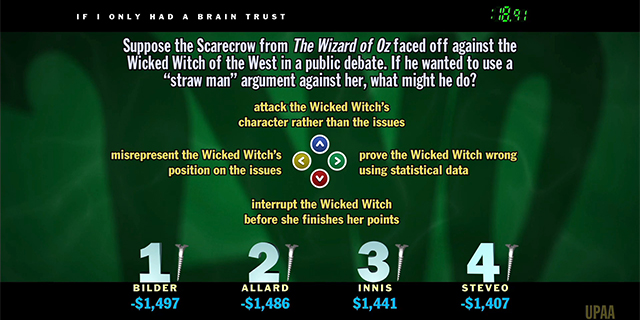
You Don’t Know Jack 2015 will likely be a big draw for many, especially those who have been following the franchise since its early days. The feel and setup borrows heavily from the 2011 revival (and subsequent ports and tweaked editions), but the questions are all up-to-date and mostly exclusive to this release. It’s capped at four players, making it more limited than the rest of this package, but there’s clearly more in attitude, complexity and pure production work that goes into Jack that makes it worth checking out.
Unfortunately, it’s also the least well-suited to this phones-as-controllers thing. Buttons are simply shown on screens, and that’d work fine, except for one thing: the delays, inconsequentially minor in the other four games, make a bigger difference when timing determines score. It’s especially bad in the Jack Attack, when hitting the button first is the only way to make your efforts count. In our tests, we kept having players with faster connections (or newer phones) exhibiting a clear advantage in the everyone-knows-it sorts of situations.
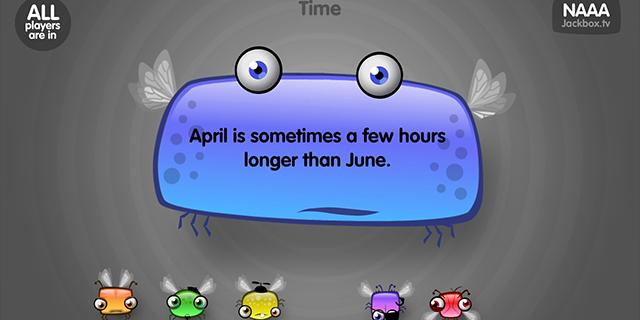
If You Don’t Know Jack 2015 embraces the phone setup the least, Lie Swatter, well, lies on the opposite end of the spectrum. Supporting 100 players at a time (and, anecdotally, possibly more), it’s geared most toward the play-on-a-stream setup that has earned Fibbage such traction. It’s very, very straightforward, though: a statement shows up on the screen, and you guess whether it’s the truth or a lie. More correct guesses means more points, and the fastest right response each round gets a bonus.
It’s an interesting novelty, and we applaud Jackbox for trying it, but there’s just not much that’s social or compelling about it. The leaderboard’s hidden most of the time, so it’s just blindly answering, and winning doesn’t actually feel that gratifying. Still, if you can put it up on a projector at a big event or use it as an intermission in a populated live stream, you may find some use for it.
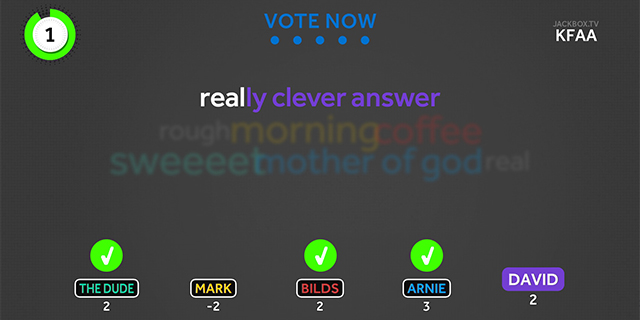
The last piece of the Party Pack puzzle is Word Spud, which is… maybe a game? It’s more of a word-association exercise: a word appears on the screen, and one player is tasked with typing a word or phrase that follows it. The others vote yes or no on it, and that player gets positive and negative points, respectively. If it’s a net positive, that word stays; if it’s not, it gets replaced by something random. Then someone else continues the chain.
Word Spud is best with a chilled-out sort of crowd, and in a context in which no one expects anything particularly funny or exciting. It’s an experimental piece for those that want something very different.
The Jackbox Party Pack is worth it for the fun of Fibbage and Drawful alone, and at a price ($25) that is less than most boxed party games you’d pick up for similar occasions. You could get some mileage out of You Don’t Know Jack 2015 with an equitable device setup, and the other two games are silly little bonuses, but don’t be surprised if they fall to the wayside in your local gatherings.
Pros: Fibbage still wonderful, Drawful also quite good
Cons: YDKJ lag frustrates, Word Spud is basically nothing



















